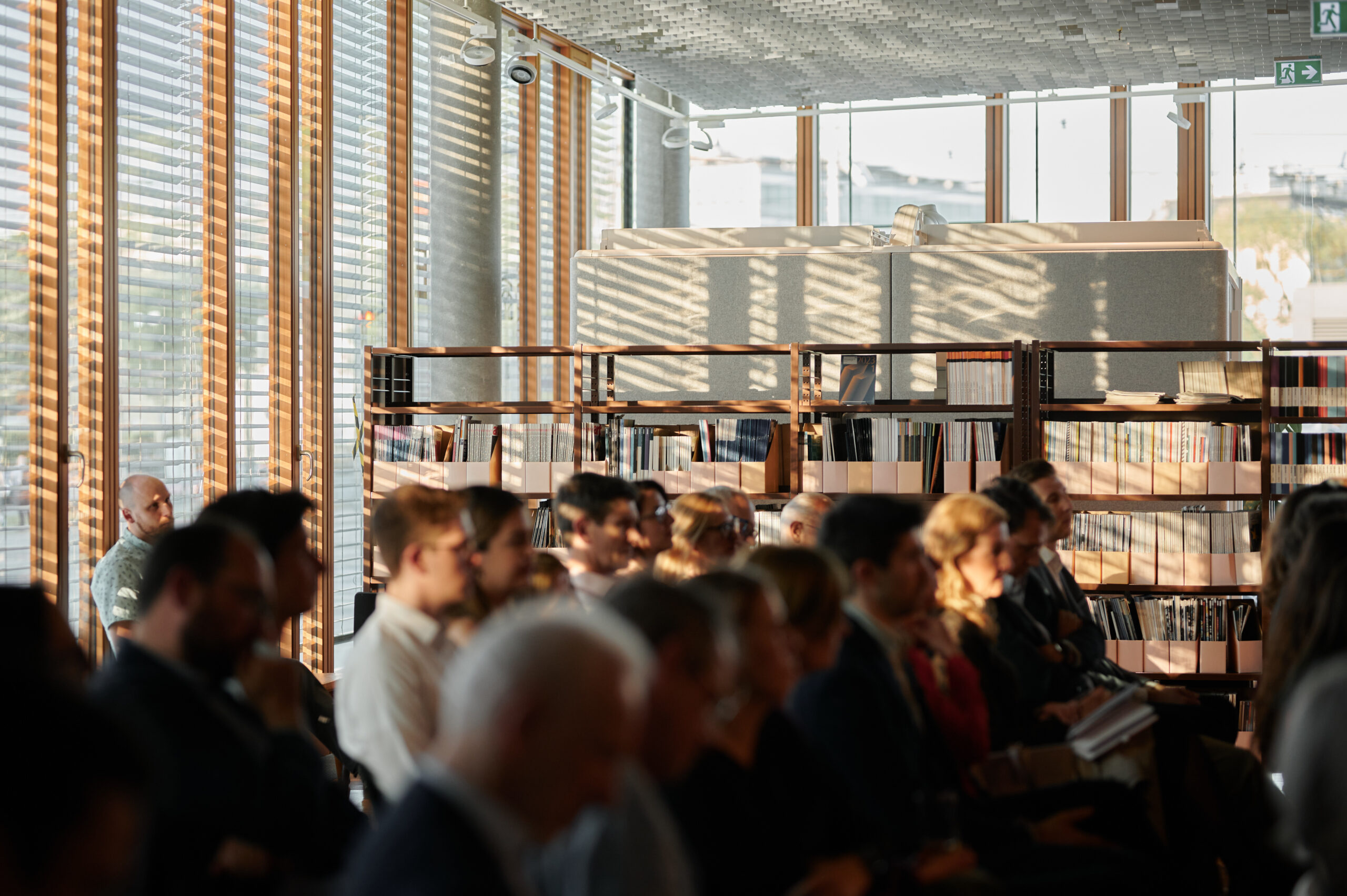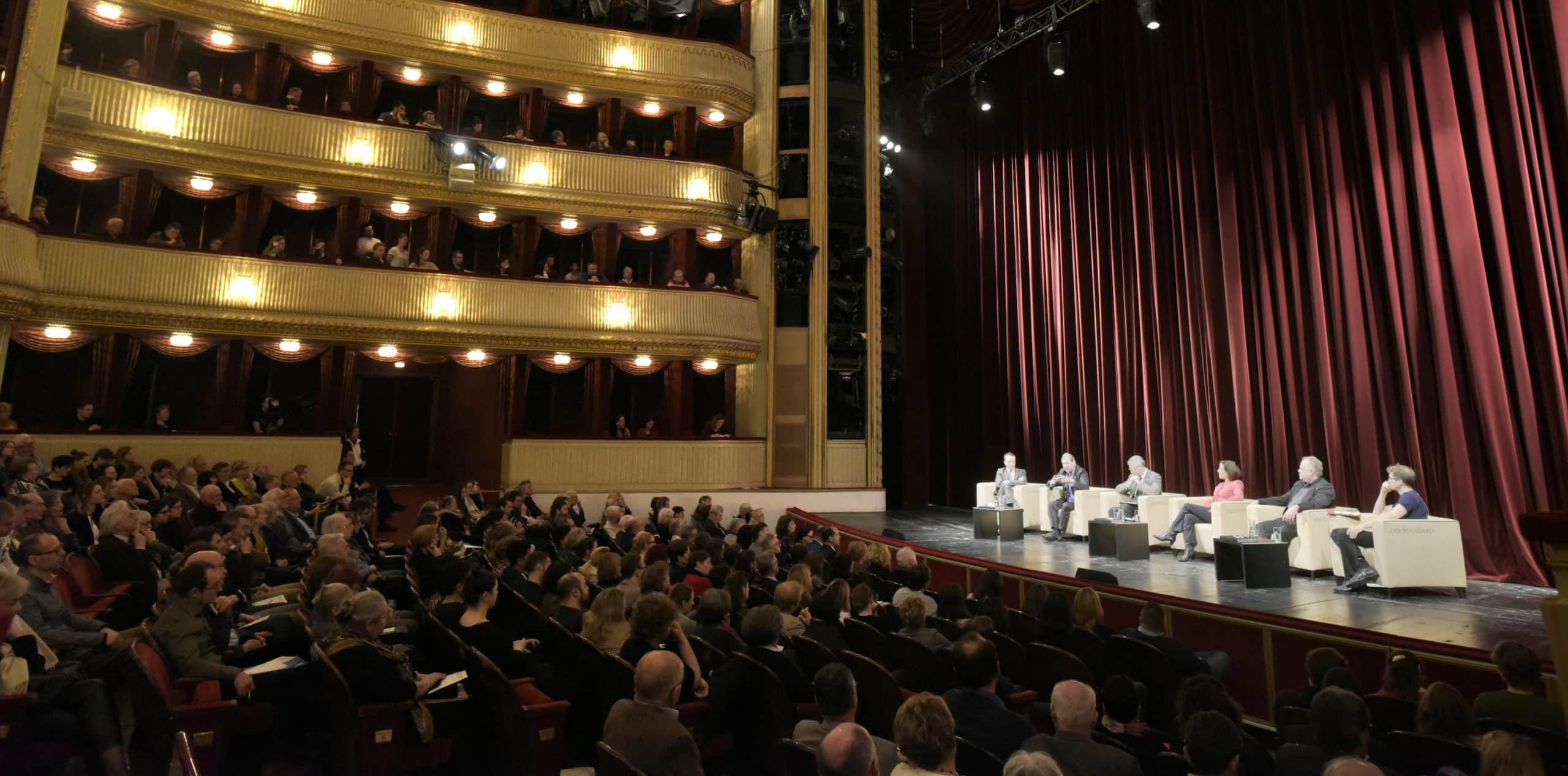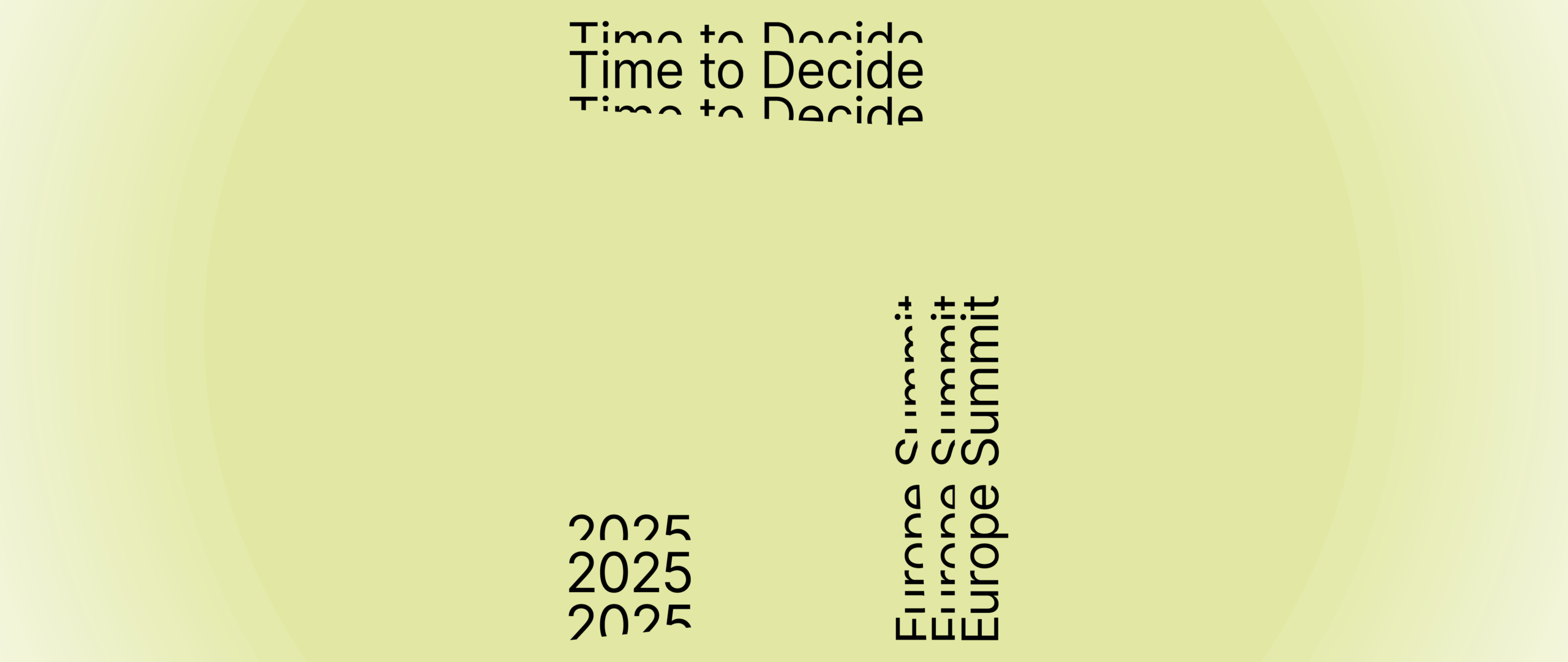Journal
16 May 2025
Reading Time: 26'
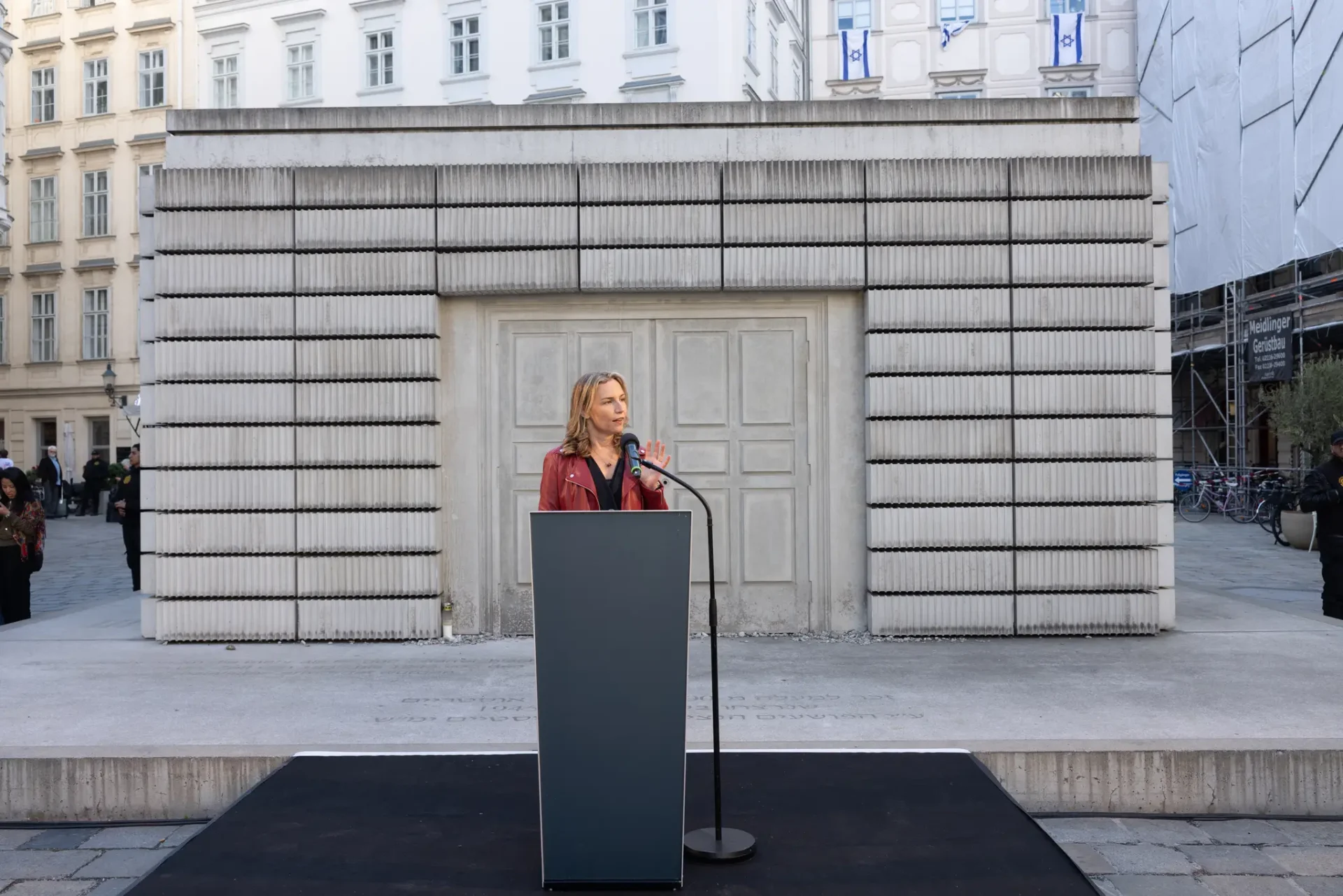
A Speech To Europe 2025: »A world in which nobody is forced to leave their home«
What does Europe mean today and how can we hear its voice in the heart of a city? In Vienna’s Judenplatz, »A Speech to Europe« offers an annual moment of reflection on Europe’s past, present and future. This year’s speech was given by renowned philosopher and political scientist Lea Ypi, speaking on migration and identity. The full text of the speech is below.
Initiated by ERSTE Stiftung to mark Europe day, the series began in 2019 with a lecture by the acclaimed historian Timothy Snyder. The timing and setting are not a coincidence. Judenplatz, steeped in layers of European history, serves as a powerful stage for ideas that shape the continent. Each year, the event invites the speaker to deliver a narrative which shines a different light on the Europe we live in, and would like to live in.
With »A Speech to Europe«, ERSTE Foundation together with our partners, the Wiener Festwochen, Institute for Human Sciences and in cooperation with the Jewish Museum Vienna, seeks to anchor the European idea, once a promise of peace and unity, into the public arena and into our shared awareness.
Tonight, I would like to talk to you about migration and identity. Perhaps the best way to start that conversation is with a presentation of myself.
My name is Lea Ypi. I’m often introduced as a philosopher, as a writer, as an Albanian citizen, or as a naturalized British citizen. When I speak to women, I’m introduced as a woman, sometimes a working woman. When I speak to mothers, I’m introduced as a mother. I’m sometimes introduced as an Albanian with a Muslim family, and sometimes as something very different from a Muslim, though still an »M«: a Marxist. Sometimes I’m introduced as another »M«: a migrant.
But I want to start somewhere else. Not with what I am, or with what people think I am, but with what I would like to be. And as it happens, what I would like to be is also what I would like Europe to be.
So what do I want to be? What do I want Europe to be?
A statue. Or to be more precise, the spirit that a statue captures.
As you probably know, the term statue comes from the Latin verb stare, meaning »to stand,« because statues »stand« in a fixed place. But it can also be connected to another word with the same root as stare: status. Status in this case is understood as »standing,« the occupying of a certain condition, the symbol of a certain way of being.
Statues don’t simply »stand« so we can look at them, or more likely these days, take selfies in front of them. Through the action or person they depict, they symbolize a certain status or condition: a condition that deserves to be remembered, carried with us in some form.
The condition that I want Europe to reflect is the condition of being human, not as humans are, but as they could be. Not in reality but as an ideal.
And the statue I have in mind as a symbol of that condition is a statue you all know. In fact, you can admire it right now (but please save the selfies for later). It stands in front of me, and behind you, right here on Judenplatz. If you turn your heads and look around, you won’t be able to avoid it.
This statue depicts a man upon a pedestal. His right leg is slightly raised, the foot resting upon a step, and the palm of his right hand is fully open, slightly stretched and brought forward as if he were trying to shake yours, opening himself to you, signaling that he is your friend. He looks at the viewer from a certain height, but not with arrogance, paternalism, or condescension. There is human sympathy in that expression, but also deep concern.
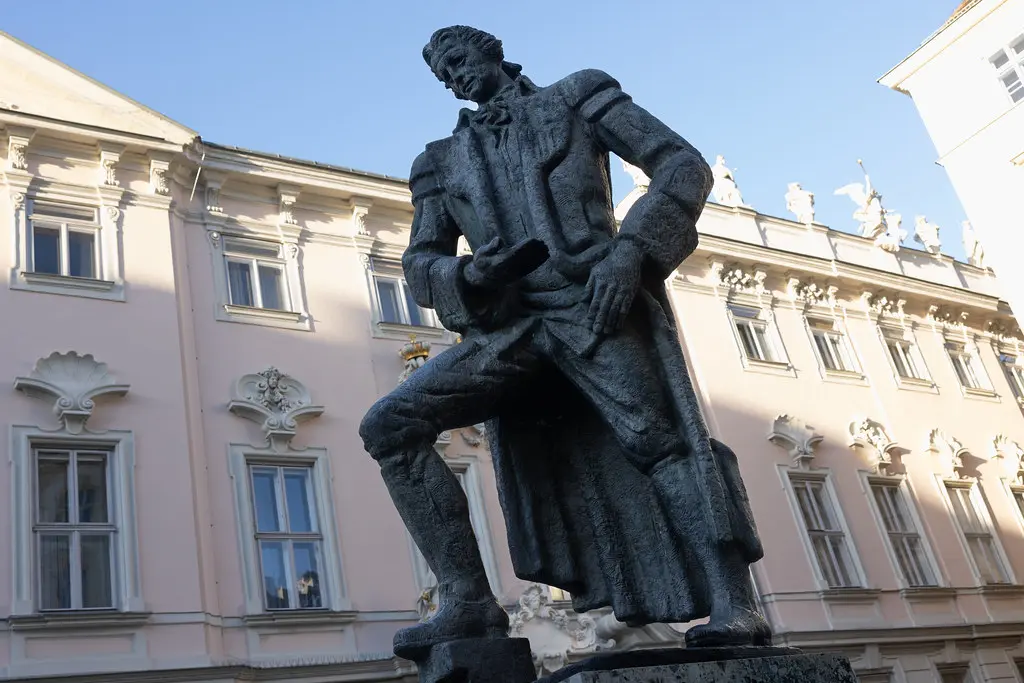
The statue is of the writer Gotthold Ephraim Lessing. Lessing was one of the most eminent representatives of the age of what we call »the Enlightenment.« The Enlightenment is sometimes defined as the »age of reason,« and sometimes captured in the motto sapere aude—to have the courage to think for yourself, in a public spirit, stepping outside fixed identities and social roles.
The Enlightenment is also much vilified these days, from both left and right. It is vilified by the right because critical reflection, the »courage to think for oneself,« has always been a threat to the passive submission to authority that is required to normalize exclusion. But it is also vilified by many on the postcolonial left, who blame the Enlightenment for the brutality, domination, and paternalism that have often characterized the encounters between European states and other parts of the world.
There is some truth to that position, but also very little nuance. The Enlightenment was of course eventually instrumentalized by elites in power for their exploitative and so-called civilizing missions, but in its inception it embodied a highly subversive stance. There is no better proof of this than Lessing himself.
During his life, his works were banned, and after his death a controversy over his alleged pantheism led to a wider attack on the Enlightenment conception of reason. That attack was taken up by reactionaries of all sorts in the two centuries that followed, culminating in an outright ban on Lessing’s work in the fascist Europe of the 1930s. This very statue is a reconstruction: the original was removed by the Nazis and melted down in 1939.
One of Lessing’s most famous plays, Nathan the Wise, touches on some of the themes of my speech to Europe today: identity and displacement, culture and conflict, migration and cosmopolitanism. The play is set in Jerusalem during one of the crusades. Its main character, Nathan the Wise, is a Jew who lives under Muslim rule and brings up an orphaned Christian girl. His own family, his wife and seven sons, have been murdered by Christians. In his absence his house has been burned. Yet, throughout the play Nathan harbors no resentment towards either the Christians or the Muslims. »And have I found in thee one more, to whom it is enough to be a man?« he asks, refusing to be defined by his identity.
At one point, Nathan is summoned by the Sultan, who interrogates him on which of the three great monotheistic religions is superior—Christianity, Judaism, or Islam. Nathan patiently explains that the right answer consists not in the past but in the future. It cannot be decided in a conservative way, he says, based on tradition, existing values, and inherited history. Each history will look superior to an insider taught to venerate tradition and to think about the enemy a certain way, but very different from the outside.
The truth of all cultures, if one can speak of truth at all, is only reconstructed, Lessing suggests, by expanding one’s gaze and looking forward, in a continuous test of which culture continues to display the virtues of humanity, remove prejudice, show the love promised in its foundational texts, and encourage tolerance in future generations.
Indeed, throughout the play, Nathan himself rejects being labeled. »We must, we will be friends,« he replies at one point to a Christian knight pressing him on his identity. »We did not choose a nation for ourselves. Are we our nations? What is a nation then? Were Jews and Christians such, e’er they were men?« he asks.
There is only one point in the play at which Nathan the Wise seems to lose his temper. It occurs in the opening lines, when he returns from his wanderings, and the woman who greets him exclaims: »Thanks to the Almighty, that you’re at last returned.« And Nathan reprimands her. »Yes,« he replies, »but wherefore this at last? Did I intend, or was it possible to come back sooner?« »I was forced to travel,« he declares.
As you can see here, there is one kind of categorization that Nathan the Wise would struggle to reject, one kind of identity. And that is the identity of the migrant, more specifically the migrant with no choice, because displacement is hardly a voluntary act.
A migrant is both a citizen of the world and a citizen of nowhere. A migrant is both open to the world and alienated by it. A migrant has to be willing to absorb everything that does not come naturally, to unlearn familiar ways of being, and to adopt new ones. But a migrant also has to be prepared to live in a permanent state of anxiety about the extent to which they can ever fully belong. For the migrant, belonging is an aspiration, something that for Lessing captured the spirit of Enlightenment cosmopolitanism.
And yet, Nathan is a good migrant. First, because he obeys the laws of the countries he visits. Second, because he is wealthy. Third, because he does not try to settle elsewhere; he eventually returns to his home, however late.
Tonight, I want to talk to you not just about good migrants but also about bad ones, the many I have crossed paths with. And I want to talk to you, in the spirit of Lessing, of the futility of applying the categories of good and bad with reference to migration, and of the slippery slope involved in attempting to do so, a slippery slope that forecloses the future and returns us to the past.
***
When I was growing up in Albania in the 1990s, the father of one of my best friends was a smuggler. We used to call him »Ben the Lame.« Ben the Lame had not always been a smuggler. Before the country made the transition from a communist state to a liberal one, he used to work shifts in the dockyard, where he would make fishing nets and repaint boats.
Ben did not look like a smuggler—he was tiny and anemic and walked with a limp. He did not choose to be a smuggler—the privatization reforms that accompanied the arrival of political pluralism forced dockyard managers to make redundancies, so Ben and his wife found themselves unemployed. Nor did he think of himself as a smuggler: it was a job like any other. He was paid to help people on dinghies reach Italy, and he needed the money to feed his children.
He was a little afraid, but not ashamed of his activity. For decades, Albanians had been murdered by their state whenever they tried to cross the border. In the very rare cases in which people succeeded, the relatives they left behind were deported. Finally, Albanians were free, and Ben the Lame was helping them to realize their dreams. He spoke of this with a touch of pride.
One night, Ben the Lame disappeared and never returned. Some people said he was killed; others that he drowned in the Adriatic Sea, eaten by the same fish he used to build nets for.
Eventually, much later, there was a funeral for him; a funeral without a body, just an empty coffin. Many people came to the funeral and spoke with gratitude about the fact that he had helped their relatives escape, offering them the possibility of choosing another life abroad. They spoke about how the remittances these relatives sent were helping families left behind stay afloat. They also spoke about how times had changed. About how when the Berlin Wall fell, and Albanians were allowed to travel outside their state, the discourse around migration suddenly shifted and there was now much more hostility towards them in the West.
It was not difficult to understand their position. In the past, Albanians had been told that we could not travel because our state would not allow us to travel, denying all of us passports. But when the Cold War came to an end, state socialism was abandoned. Almost overnight, the state recognized the right to leave.
And yet people discovered that having the passport wasn’t enough. You also needed a visa for which your own state was not responsible, and that turned out to be the responsibility of another state. Very suddenly, all the constraints on freedom of movement, which we had internalized by accepting that we couldn’t travel because we weren’t allowed to travel by our own state, became external.
The West had spent decades criticizing the East for its closed borders, funding campaigns to demand freedom of movement, condemning the immorality of states committed to restricting the right to leave. Exiles used to be received as heroes. All of a sudden, the rhetoric changed. The heroes had now become criminals, dangerous subversives who threatened the »European way of life.«
And yet, if freedom is a value, if freedom of movement matters, it matters both in emigration and in immigration: both to leave your country and to enter another country. If I am told I’m free to leave this square but the roads that would enable me to leave the city are closed, do I really have freedom of movement? Just when the former socialist states were no longer shooting their citizens at the border, capitalist countries began to send boats to patrol their seas. In one direction or the other, migrants were still dying. Only the color of the uniforms had changed, the flags under which the crimes were being perpetrated.
Border guards, patrol boats, and the detention and repression of immigrants that was once condemned outside Western liberal states have now become standard practice in those countries. These measures are not just tolerated but celebrated as a sign of strength. The West has perfected a system for excluding the most vulnerable and attracting the most skilled, all the while defending borders to »protect our way of life.« And yet, those who sought to emigrate did so because they were attracted to that way of life. Far from posing a threat to the system, they were its most ardent supporters.
Since the end of the Cold War, migration has been both a blessing and a curse for many states around the world. It has been a blessing because without remittances from migrants, their families would have struggled with the devastating impact of the neoliberal »shock therapy« reforms that promised to turn failed communist states into flourishing capitalist paradises.
It has been a curse because Lessing is right. One does not really choose to be a migrant. Contrary to what anti-migration propaganda would have you believe, nobody enjoys endangering themselves or leaving their country just for the sake of annoying people in another. Even putting aside the perils of unauthorized crossings, and even where legal routes are available, migration tears families apart, and brain drain is an open wound.
Every year these states invest in doctors and nurses who abandon their country soon after graduation, lured by the higher salaries and better living conditions in the West.
When you support a selective immigration system or agree that a country in the West needs to invest in attracting highly skilled migrants, you are effectively endorsing a form of exploitation.
Migrants from another country will work and pay taxes for the sick and frail to be looked after by their doctors and nurses, for your children to be looked after by their teachers. Hospitals there will suffer shortages so that patients here can continue to receive adequate care. Schools and research centers there will suffer so that education here can flourish.
***
Borders are said to be the definitive problem of our time. Of course, borders are a problem, but not because there is any civilizational question that must be solved to establish who belongs and who doesn’t. Not because there is a problem of cultural adaptation by some groups compared to others. Certainly not because, as Giorgia Meloni recently told Donald Trump, Europe’s aim should be »to make the West great again« and migration represents a challenge to that goal.
Indeed, there is nothing more insulting to the wisdom of Nathan the Wise, with which I began, than this idea that there is one civilization, one way of life, that embodies the truth and values of living together. Not even European civilization. As Nathan insists to the Christian knight in Lessing’s play, »all lands produce good men.« The knight challenges this assertion. »Here more, there fewer sure?« he suggests. But Nathan rejects this too. He knows that greatness eventually comes at a cost, and that the cost of cultural hierarchy is the destruction of the other, of anyone perceived to be a threat, anyone deemed unlikely to fit.
If you are in any doubt about what exactly that cost looks like when it is taken to its extreme consequences, just look at the memorial behind my shoulders, a memorial to the victims of the most devastating project of making something great again that humanity has ever known: the Holocaust. This too is a product of European, Western values, a project that promised to purge society of its unwanted elements, to eliminate Jews, communists, Roma, the disabled, homosexuals, anyone deemed not to fit.
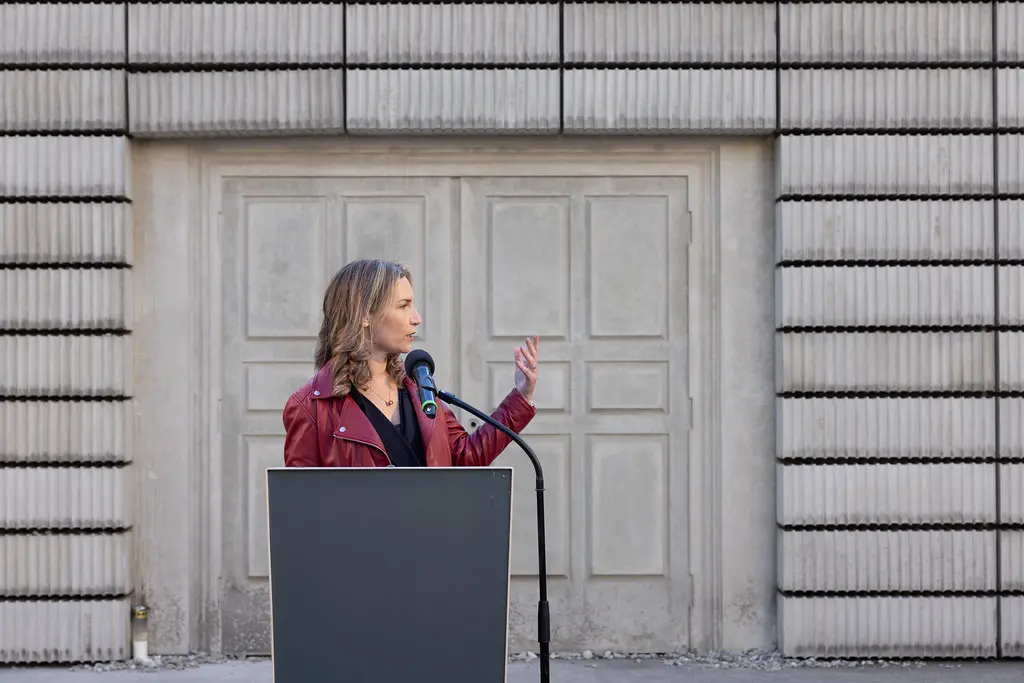
This must be the starting point of any discussion of migration in Europe, rather than trying to distinguish between good and bad migrants, migrants who are useful and migrants who are not, migrants who are a benefit and migrants who are a burden, migrants who obey the law and migrants who follow their own rules, economic migrants and asylum seekers, migrants who only come to stay for a while and then return to their homes and migrants who aspire to settle, migrants who deserve hospitality and migrants who must face deportation.
To reckon with migration as a problem is to understand that it is not a problem as such. It is to understand the dangerous slippery slope involved in normalizing this very stance in political discourse.
If we look at migration only in terms of numbers and flows, the data suggests that while the number of people living outside their country of birth has been increasing in absolute terms, that rise is in line with the rise in global population and therefore proportional to migration flows in the past. If we look at the contribution of migrants in host societies, there is little evidence for concluding that migrants are a burden in absolute terms.
Migrants help counter demographic decline, they pay into social security systems, and they contribute to host societies. This even goes for irregular migrants, in cases when paths to regularization are available. And of course, if visas were easily accessible you would not have irregular migration at all.
Yet migration is still invoked as a problem in political discourse.
The problem is political, not cultural. The issue has nothing to do with migrants themselves but everything to do with the crisis of liberal democracy, a crisis which migrants did not bring about, and which is certainly not deepening on their account—if anything, it is the reverse. The problem is the right’s hegemony over the discourse on migration, and an inability, a »lack of courage« (to return to the Enlightenment) to think critically, to think beyond the ideology and propaganda that attempts to persuade us otherwise.
But an alternative struggles to emerge. Because even those who reject specific migration policies have bought into the politics of it. Because many progressives have abandoned universalism, and instead of challenging the cultural terms with which migration is framed, they merely offer their own interpretation of the phenomenon. Because the left has abandoned the language of class and embraced the language of culture; because it has replaced a socio-economic diagnosis of the problems of the world with an identity-based one.
***
For a long time now, liberal societies have been failing on many fronts. Let me list just three here. First, the failure of democratic politics, the increasing gap between representatives and the represented, a party system that works increasingly like a business cartel, a relationship between politicians and the people that resembles the relationships between businesses and consumers.
Second, a failure of social justice: an economic system unable to cater to the concerns of the most vulnerable (both citizens and non-citizens), to manage an economy that works for everyone, and to guarantee mechanisms for fighting against the organized interests of oligarchs, big capital, wealthy donors, and corporate digital platforms—in short, anyone who uses their money to purchase political influence.
Third, a failure of international solidarity: the incapacity to offer an alternative vision of a global order that would include a reform of international institutions to make them genuinely representative of vulnerable people and vulnerable countries, to introduce a model built not on antagonism but cooperation.
This is the complex picture of the world from which the global inequalities that produce asymmetric migration emerge.
The problem, as I see it, is that we have chosen a model of society at odds with the humanism characteristic of Lessing’s spirit, a model where the pursuit of profit subordinates relations between humans to the imperatives of the market.
A political community that blames its failures on those who are not part of it, or have no claim to be part of it, or are seen as undeserving of being part of it, does not need to take responsibility for its failures: it can continue to blame such failures on the most vulnerable and pretend to have solutions on offer once »the other« is no longer a threat.
The promise held out by the right is this: if you solve the question of who belongs, you will have solved the conflicts of our time.
But migration, as I mentioned earlier, is not the source of the problem; it is rather a symptom of the crisis. And here is where the failure of the alternative lies. The question of political progress is now only seen as a question of abstract law and rights, of who shapes and enacts laws, of who is included and who is excluded. In other words, it has become a question of regulating the terms of political membership. Migration is perceived as a problem because political membership is seen as the solution.
Culture wars are so salient because they are about policing the boundaries of a social group, including the question of who can speak on behalf of that group. If there is no alternative available to challenge this way of thinking about the problem, if we are unable to rethink the role of culture, its connection to democracy and the fate of democracy under capitalism, it is hard to see how any proposed solution will not end up playing into the hands of the right.
And yet, it is not difficult to deconstruct the right’s discourse on migration. Borders as such are not a problem, because borders have always been (and will continue to be) open for some and closed for others. The right’s very approach to the question confirms this point.
To see the case, consider two dominant recent trends. The first trend applies to the very poor. Leaving aside the current projects to deport failed asylum seekers to third states in violation of international norms, the path to citizenship is no longer straightforward even for regular migrants. From minimum income requirements to qualify for residence to linguistic and civic integration tests when applying for citizenship, these seemingly innocuous measures can turn into insurmountable obstacles that condemn newcomers to being permanent second-class members of host societies.At this level, migration is nothing but a war waged on the most vulnerable. When people have no political voice, they are much easier to exploit.
The second trend applies to the very rich. For them, borders are more open than ever; indeed, it has become increasingly easy to earn citizenship in a new state by simply purchasing it. Consider a recent example: in the same weeks in which the White House was posting videos of irregular immigrants literally boarding deportation flights in shackles, Donald Trump announced his plans to sell US residence and a path to citizenship for five million dollars to rich individuals applying for »gold« green cards.
This is by no means an isolated case. Across the world, financial investors, property developers, or individuals willing to pay a substantial fee in exchange for a different passport are put on an accelerated and facilitated path to naturalization.
Both trends speak to a radical reversal in the way we now understand identity and belonging. The hope of social democracy in the early 20th century was that democracy would bring about the abolition of differences of class, gender, race, and so forth. In the words of the German politician and Marxist theorist Eduard Bernstein, the founder of social democracy, »the parties and the classes supporting them soon learn to recognize the limits of their power.«
The right to vote makes citizens virtual partners in a cooperative enterprise advancing the good of the political community as a whole. This was the dawn of an age in which the barriers of property, literacy, and technical expertise were being removed as a result of political mobilization to expand the franchise.
The conditions for such an optimistic assessment, if it ever was justified, are no longer in place. The current trend is in fact precisely the reverse. If in the golden age of expansive citizenship, democracy promised to heal the political community from the potentially destructive effects of class conflict, in the age of restrictive citizenship the struggle can no longer be institutionally mediated, it can no longer be contained in the standard channels of political participation.
Once citizenship becomes again citizenship for a restricted few, a commodity to be bought, sold, and exchanged, democracy degenerates into a form of oligarchy through which wealthy elites control political power. When citizenship is bought and sold, instead of being a vehicle of political emancipation, it becomes a vehicle of oppression.
With all due respect to Bernstein, this consolidates rather than erodes the class character of the state. To say that the state has a class character is equivalent to saying that the state loses its ability to act as the political platform through which conflicts between social groups are balanced and mediated in a fair way through democratic representation. Instead the state becomes an instrument that serves to reward members of groups with more money and power and to constrain and punish the rest. Instead of being the tool through which to temper the excesses of markets through democratic representation, when citizenship is bought and sold it turns into a commodity like everything else.
Whilst in theory still paying lip service to an emancipatory ideal of citizenship, progressives around the world are surprisingly silent on the transformation of citizenship based on these exclusionary tendencies. Neither social-democratic official policy papers nor the electoral manifestos of left-wing parties seem to show any concern with finding measures that could oppose the current trend and find remedial measures. The collapse of civic politics into ethnopolitics and the reduction of the universal, progressive ideal of citizenship into a particularistic, conservative one proceeds undisturbed for the most part.
What does a genuine alternative require? Refusing to play ball. Rejecting the reduction of democracy to membership and of political conflict to cultural conflict. Situating the question of migration in the context of wider social injustices brought about by the decline of welfare states, followed by the impunity of profit-seeking employers who pit poor people (whether native or immigrants) against each other. It requires a further discussion of why there are wars around the world, and how their weaponization contributes to asymmetric migration flows. In short, it requires a discussion of how the crisis of social democracy is linked not to the rise of cultural conflicts but to decades of social and economic policies, both at home and abroad, designed to empower organized capital and disenfranchise vulnerable people.
Again, the problem is not the simple existence of borders, or the presence of borders that are more open or more closed, as some prefer to construct the migration dilemma. The problem is that exclusions both within the state and between states mutually support each other and serve to further entrench an economic order that is unchallenged at its core. The practice of selling citizenship to the rich and of restricting access to it for those with few material means, education, or civic skills tells us an important story about the relation between capitalism and the allegedly democratic state.
If we don’t change the way we conceive that relation, we will enter a slippery slope on which they first come for irregular migrants, then they come for resident non-citizens, and then they come for citizens whose names are Mohamed and Abdallah, just as they used to come for the Goldschmidts and the Levis. Is it hard to see how this will happen? Can we say that we’ve never been there before?
In conclusion, I want to return to Lessing. The cosmopolitan stance Nathan the Wise embodied should not be confused with Good Samaritanism or with the humanitarian ethics that are sometimes invoked in defending the rights of migrants. The Enlightenment was for many of its champions a political and not just a moral project: the rejection of institutions that fail to represent every human being; the public critique of ideas that favor one ethnic, religious or racial group, one class, or one political community over another.
The Enlightenment urged people to reject values that don’t stand up to rational scrutiny, to embrace a critical outlook as opposed to the hypocrisy of those in power, and to resist any claim to authority, including the authority of those who promise to have our interests at heart. This abandonment of the spirit of the Enlightenment just when it’s most needed is tragic but not entirely a coincidence. Obedience requires ignorance; ignorance helps obedience. And we are increasingly becoming used not to thinking but to following trends.
That is why I began by invoking the spirit of that statue. Because there may be more humanity in its silent stone than in the actions of many European leaders today. The values Europe so proudly proclaims—so unilaterally, so uncritically—are worth very little if they apply only to a few. They must be grounded in a broader commitment to national and international social justice, to a future that decisively rejects any longing for past greatness, any illusion of civilizational superiority, and any compromise with global egalitarian and radical democratic ideals. Migration, the injustices that migration reveals, are on the frontline of this struggle. Because it is not in the promise to make the West great again that Europe’s promises are most critically tested, but in the commitment to freedom, equality, and a world in which nobody is forced to leave their home.
Header image: eSeL.at – Lorenz Seidler (eSeL)
